Led By David Popovici, A Look At the Sport’s Rising Youth Stars Around the World
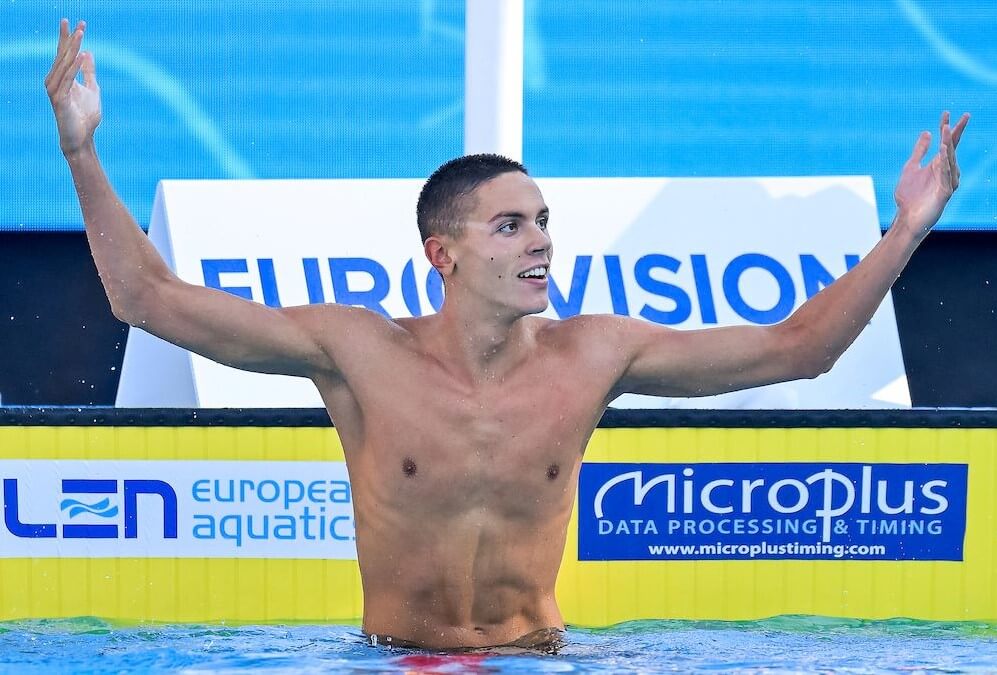
Led By David Popovici, A Look At the Sport’s Rising Talent Around the World
An influx of rising stars is powering the sport, with swimmers from around the world making their mark during a packed schedule of international racing over the past four months.
One month before making his Olympic debut, 16-year-old Romanian David Popovici put the swimming world on notice at the European Junior Championships with marvelous swims in the 100 and 200 meter freestyle. He finished just off the podium at the Tokyo Games, a mere 4-hundredths back of the bronze-medal spot in the 200 free, but all the signs were there for a future star.
And in less than a year, Popovici reached that level. He was the dominant freestyler of the 2022 World Championships, winning gold in the 200 free by more than a second and scaring the world record in the 100 free.
Six weeks later at the European Championships, Popovici broke a 13-year-old world record in the 100 free with a mark of 46.86, edging past Cesar Cielo’s vaunted standard that generations of sprinters, most recently Caeleb Dressel and Kyle Chalmers, could not touch. And in the 200 free, Popovici swam a mark of 1:42.97, becoming the third-fastest performer in history and fastest ever in a textile suit. All at the ripe old age of 17!
Popovici was the only teenager to break an individual world record this year, but he was among a huge group of young swimmers to make their mark during a packed schedule of international racing over the past four months. The stretch kicked off with the Budapest World Championships in mid-June and also included the Commonwealth Games and European Championships as well as the European Junior Championships, Junior Pan Pacific Championships and World Junior Championships.
In this list of rising stars, we will consider men’s swimmers born in 2002 or later and women’s swimmers born in 2004 or later.
MEN
Leon Marchand, France (age 20): Marchand, who trains at Arizona State University under Coach Bob Bowman, the longtime mentor of Michael Phelps, mounted a serious threat to the 14-year-old Phelps world record in the 400 IM this year before settling for the second-fastest mark in history at 4:04.28. The Frenchman won world titles in the 200 and 400 IM along with a silver medal behind Hungary’s Kristof Milak in the 200 butterfly, and he has also achieved remarkable success in college waters, with two NCAA titles and the fastest time ever in the 200 yard IM as a freshman. Marchand is already the world’s top medley swimmer, with a real chance at becoming the face of a home Olympic Games in Paris in two years.
Hwang Sun-Woo, South Korea (19): If not for Popovici, Hwang would be the young star everyone was talking about in the 200 free. Last year, Hwang tried to run away with Olympic gold in the event as he led convincingly through the first 150 meters, but he faded badly down the stretch. But this year, Hwang managed to put the whole swim together as he recorded a mark of 1:44.47 in the Worlds final for a silver behind Popovici. He could contend for medals in this event for a long time, and he’s also a superb 100 freestyler, having finished fifth in that event in Tokyo.
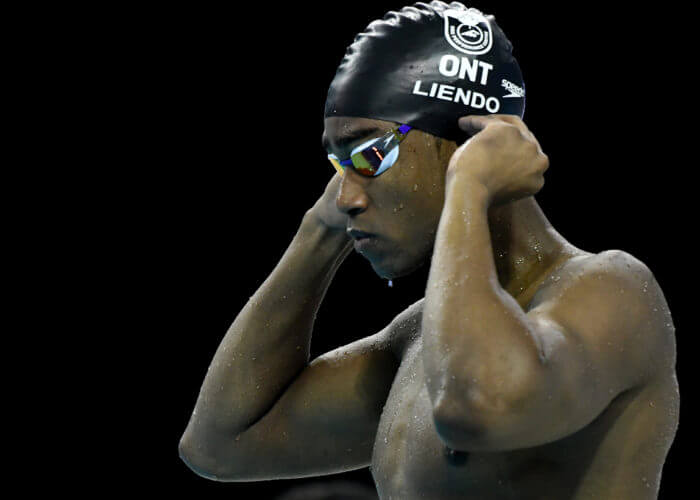
Photo Courtesy: Scott Grant/Swimming Canada
Joshua Liendo, Canada (20): Canada’s women have emerged as one of the world’s premier swimming nations, and now, the country has a men’s star with this emerging sprinter. Liendo was a semifinalist individually at the Tokyo Olympics, and he went on to win bronze medals in the 50 and 100 free at the Short Course World Championships in December 2021. This summer saw him win a pair of bronze medals at Worlds in the 100 free and 100 fly plus a silver as part of Canada’s mixed 400 free relay. At the Commonwealth Games, he claimed gold in the 100 fly plus bronze medals in the 50 free and two relays.
Ksawery Masiuk, Poland (17): This quickly-improving backstroker won his first senior-level international medal in the 50 back this year at Worlds with a bronze, but he has already earned quite a collection of medals on the junior stage, including a sweep of the backstroke races at the European Junior Championships this year and golds in the 50 and 100 back at the World Junior Championships. Masiuk swam as fast as 24.44 in the 50 back, 52.58 in the 100 back and 1:56.66 in the 200 back, all of which rank him in the top eight in the world for 2022.
Ahmed Hafnaoui, Tunisia (19): He skipped this summer’s international meets, but it was only one year ago that Hafnaoui pulled off one of the most surprising swims of the Olympic Games, as the little-known teenager won gold in the 400 free from Lane 8. That effort made him just the second swimmer ever from Tunisia to capture an Olympic gold medal in swimming after Ous Mellouli. Later in the year, he was the silver medalist in the 1500 free at the Short Course World Championships. Hafnaoui, who is expected to swim at Indiana University beginning this fall, should have a bright future in the freestyle races 400 meters and above.
Ilya Borodin, Russia (19): Borodin has yet to compete in a global-level long course international final after missing the Olympics after testing positive for COVID-19 and being part of the Russian ban from international competition this year. But when Russian swimmers are allowed to return to international waters, watch for Borodin to be right in the mix in the 400 IM. He set a world junior record of 4:10.02 in winning last year’s European title, and he claimed silver in the 400 IM at the Short Course World Championships in a very tight finish behind Daiya Seto.
Hubert Kos, Hungary (19): Kos is the world junior record holder in the 200 IM (1:56.99) and was the European champion in the event this year after placing sixth in the World Championships final. Kos is slated to begin swimming at Arizona State University this year alongside Marchand.
Sam Short, Australia (19): Australia has a long history of success in the men’s distance races, and Short could be on track to join that group after a breakthrough performance this year. He narrowly missed the 800 free final at the World Championships, and then at the Commonwealth Games, Short claimed a silver medal in the 400 free and gold in the 1500 free, where his time of 14:48.54 was good enough for seventh in the world rankings. Already, Short is the fifth-fastest Australian ever in the 30-lap race behind only Grant Hackett, Mack Horton, Kieren Perkins and Jack McLoughlin.
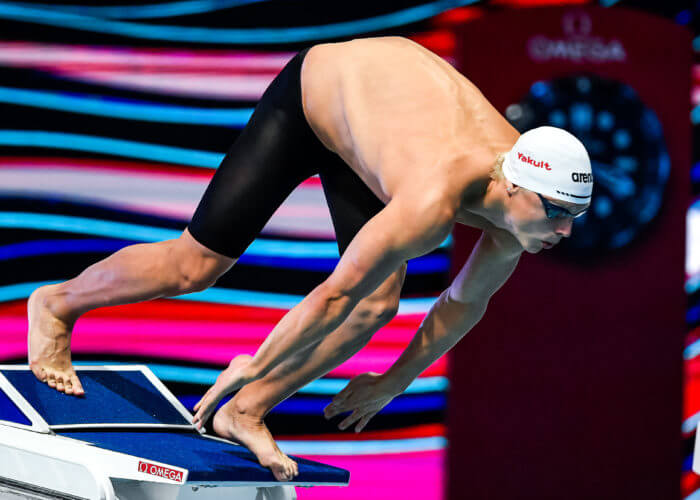
Photo Courtesy: Photo Andrea Staccioli / Deepbluemedia / Insidefoto
Matt Sates, South Africa (19): Sates was another swimmer to qualify for a Worlds final this year as he placed eighth in the 200 IM, but if his short course success is any sign, Sates could be on track to a big future. He is the world junior record holder for the 200 free, 400 free and 200 IM in short course meters, and during a brief stretch earlier this year when he competed collegiately for the University of Georgia, Sates was dynamite in the freestyle races, winning an NCAA title in the 500 yard free.
Flynn Southam, Australia (17): Southam got a taste of senior-level swimming at the Commonwealth Games, where he contributed to three Aussie relay gold medals, and then he crushed his competition at the Junior Pan Pacific Championships in August. Southam swept the 50, 100 and 200 free at that meet, and most impressive was his 48.23 100 free that ranks him among the top 20 swimmers in the world. Southam also split as fast as 1:46.08 in the 200 free this year. At the very least, Southam is expected to be part of medal-contending Australian relays going forward, and he has very real individual potential in the sprint events as well.
Lorenzo Galossi, Italy (16): Italy has produced a stable of impressive distance swimmers over the years with the likes of Gregorio Paltrinieri and Gabriele Detti, and now Galossi could be the next name on that list after he won 800 free bronze at the European Championships in 7:43.37, a new world junior record. He is the sixth-ranked swimmer in the world in that event and 11th in the world in the 400 free. Galossi has also posted numerous 1:47 splits on Italy’s 800 free relay teams, and he won five medals, three of them gold, at the European Junior Championships this year.
Diogo Matos Ribeiro, Portugal (17): One of the breakout stars of the World Junior Championships in Lima, Peru, Ribeiro won three gold medals in the 50 free, 50 fly and 100 fly. The most impressive of those was his 22.96 effort in the one-lap butterfly race. Ribeiro also has been in the 48-mid territory in the 100 free. He could be a factor in the sprint free and fly events on the senior level soon.
Daniel Diehl, USA (16): The United States is always loaded in the backstroke events, but it’s worth keeping an eye on Daniel Diehl, who broke Ryan Murphy’s national age group record in the 100 backstroke for the 15-16 age group. Diehl swam as fast as 53.27 at Junior Pan Pacs, and he split as fast as 48.66 on a world junior record-setting 400 free relay for the Americans.
Thomas Heilman, USA (15): Here is a swimmer farther away from senior-level international contention, but we should keep an eye on Heilman, who turned 15 early this year after setting U.S. age group records in nine events in the 13-14 age group. He has already broken 15-16 records in the 100 free (a mark that was previously Caeleb Dressel’s) and 100 fly (previously Luca Urlando’s), and he won three gold medals plus three silvers at Junior Pan Pacs.
WOMEN
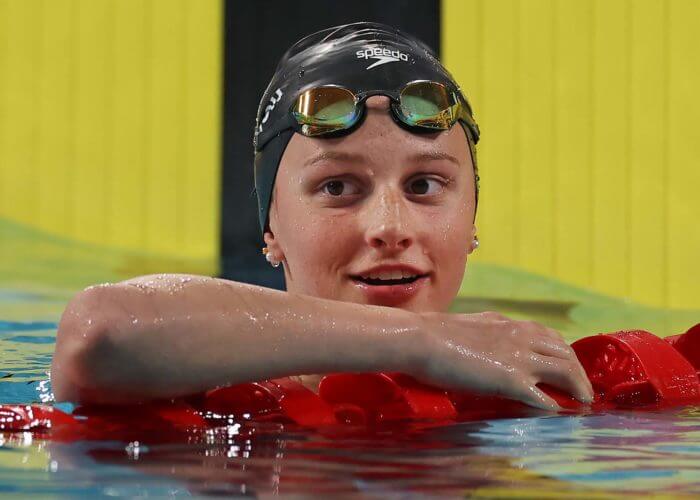
Photo Courtesy: Swimming Canada/Ian MacNicol
Summer McIntosh, Canada (16): At age 14, McIntosh finished one spot away from the Olympic podium in the 400 freestyle, and stardom appeared imminent. One year later, McIntosh has already won world titles in the 200 butterfly and 400 IM, with her top 400 IM mark of 4:29.01 making her the third-fastest performer in history. She then won both medley events at the Commonwealth Games. McIntosh also won silver medals in the 400 free at both the World Championships and Commonwealth Games, becoming only the fourth swimmer ever to break 4:00, and she posted a 200 free relay leadoff at Worlds that would have been quick enough for an individual world title. When she turned 16 in August, she was already the owner of four world junior records, and her early success and track of continued improvement makes her one of the most exciting swimmers in the world.
Mollie O’Callaghan, Australia (18): After winning three Olympic medals (including two gold) as a relay alternate, O’Callaghan stepped up to become Australia’s top 100 freestyler in 2022. She won world and Commonwealth titles in the event, plus silver medals at both meets in the 200 free. O’Callaghan helped Australia set a world record in the 800 free relay at the Commonwealth Games, and she now ranks eighth all-time in the 100 free (52.49) and sixth in history in the 200 free (1:54.01). After a dominant performance from the Australian women at last year’s Olympics, O’Callaghan figures to be at the forefront of the Aussies’ continually front-running women’s team for years to come.
Benedetta Pilato, Italy (17): Pilato was a World Championships medalist at age 14, so she’s not exactly new to the international scene. In 2021, she set her first long course world record in the 50 breaststroke, but she was unable to make an impact in the two-lap breaststroke race on the Olympic level. But in 2022, Pilato came out on top of a tightly bunched field at the World Championships in the 100 breast, and she was also the silver medalist in the 50 breast. Later on, she matched those placements at the European Championships. If she can maintain that momentum, Pilato could be among the world’s elite sprint breaststrokers for a long time.
Katie Grimes, USA (16): Here’s yet another swimmer already capturing international medals in her best events. Grimes was a surprising qualifier to the 2021 U.S. Olympic team, and she placed a close fourth in the 800 free in Tokyo. This year, she reached the podium in a pair of events at the World Championships, with silver medals in both the 1500 free and 400 IM. She already ranks ninth all-time in the mile (15:44.89) and in the all-time top 20 in the 400 IM and 800 free.
Claire Curzan, USA (18): It feels as though Curzan has been on the scene for a while, but she only recently turned 18 in late June after capturing her first individual World Championships medal in Budapest. The medal was a bronze in the 100 backstroke, and Curzan also qualified for finals in the 100 fly, 100 free and 50 free at that meet while helping the Americans to four relay medals (including two gold). Curzan ranks 10th all-time in the 100 fly (56.20) and 11th in the 100 back (58.39).
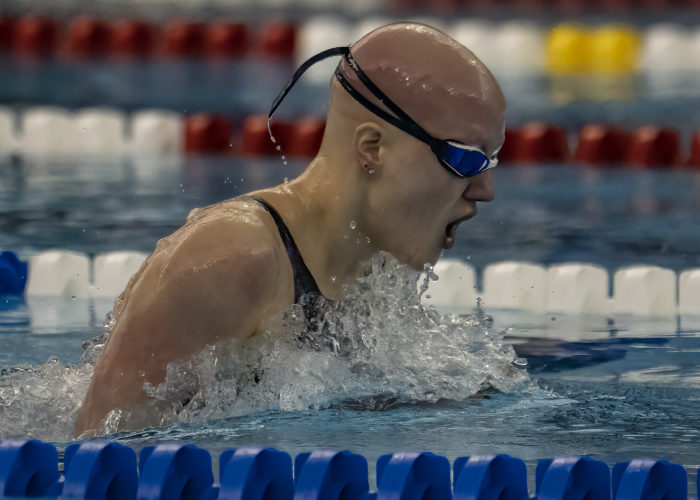
Photo Courtesy: Peter H. Bick
Leah Hayes, USA (16): The sixth and final female swimmer age 18 or younger to win an individual medal in Budapest was Hayes, who knocked almost four seconds off her best time in the 200 IM this year on her way to bronze in the 200 IM. Hayes was a surprise qualifier to the Worlds team as she dropped under 2:10 for the first time, and then she got all the way down to 2:08.91 (a world junior record at the time) in Budapest.
Evgeniia Chikunova, Russia (17): While the entire Russian team is currently banned from international competition, it was only one year ago that Chikunova finished just 4-hundredths away from the Olympic podium in the 200 breaststroke, and she was also fourth in Tokyo in the 100 breast. With a lifetime best of 2:20.57, she is the 10th-fastest performer ever in the longer distance.
Lana Pudar, Bosnia and Herzegovina (16): Pudar is a rising force in the butterfly events, having won the European title this year in the 200 fly and having earned bronze in the 100 fly. Pudar was the youngest swimmer in that European final, but she was aggressive and unafraid as she went out under 1:00 and hung on to claim gold in a tight finish. As she refines her race strategy, her back half should improve and give her a chance at more international honors.
Mio Narita, Japan (15): One year after Yui Ohashi won Olympic gold in both women’s individual medley events, Narita could become the next Japanese medley star after sweeping the 200 and 400 IM at both Junior Pan Pacs and the World Junior Championships. Narita’s best time of 4:36.71 would have placed her fourth at this year’s senior Worlds, just 7-tenths away from bronze, and she has been as fast as 2:11.22 in the 200 IM.
Elizabeth Dekkers, Australia (18): Australia has a long-standing tradition of success in the 200 butterfly (think Susie O’Neill, Petria Thomas, Jessicah Schipper and Maddie Groves), and Dekkers could be next in line. After narrowly missing out on selection to the 2021 Olympic team, she won gold in the event at the Commonwealth Games this year after placing fifth at Worlds.
Bella Sims, USA (17): Sims is skilled in a wide range of freestyle events, ranging all the way up to open water, but her best race is the 200 free. She qualified for last year’s Olympic team and this year’s Worlds team as an 800 free relay alternate, and she showed some grit in Budapest when she anchored the Americans’ gold medal-winning squad in 1:54.60, almost three seconds quicker than her flat-start best time.
Claire Weinstein, USA (15): Another member of the winning 800 free relay for the United States at this year’s World Championships, Weinstein was a surprise qualifier for the team after finishing second to Katie Ledecky in the 200 free at the U.S. International Team Trials. She trains with Grimes and Sims at the Sandpipers of Nevada club in Las Vegas, and she dropped more than two seconds from her best time in the 200 free this year to make a swift jump to senior-level racing.
Erin Gemmell, USA (17): Here’s yet another 200 freestyle specialist from the United States. Gemmell actually swept the 100, 200 and 400 free titles at Junior Pan Pacs, but her best event is the 200 free. She missed World Championships by one spot, but later in the year, she clocked 1:56.14, the year’s second fastest time in the U.S. behind Ledecky.
The latest issue of Swimming World Magazine
is now available for download in the Swimming World Vault!
Get Swimming World Magazine and SW Biweekly FREE When You
Become A Member of the International Swimming Hall of Fame
New! 30 Day Membership to ISHOF AND Digital Swimming World Subscription for just $10 a month!
Want more? Get a 1 Year ISHOF Family Membership With Swimming World Print AND Digital Subscription Order Now!
Non-Subscribers can click here to download this issue for only $5.94




… especially if taking into consideration the kind of conditions they train in (e.g. shout out to Lana Pudar).
?